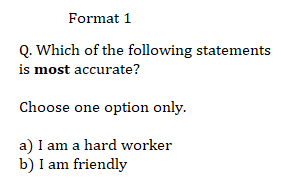In psychology, ipsative measurement refers to a particular type of survey or assessment in which a respondent is forced to choose among several generally desirable options. Unlike normative tests, where a respondent answers questions with scaled responses, ipsative tests do not have an scale within the question. While normative tests can compare an individual to the norm or the population at large, ipsative tests compare a person with himself, and so highlight his (relative) strengths and weaknesses.

The key assumption behind ipsative measurement is that a statement that is most true about us will also seem the most desirable. Ipsative testing is often called forced-choice testing.
Example of Ipsative Test Questions
A typical forced-choice test question will give a list of positive declarative sentences, and ask the respondent to pick the one that is most true. They may also be asked to identify the statement that is least true. For example, the statements might be:
- No matter what challenges present themselves, I never give up
- I am fun to be with and tend to be the center of whatever gathering I am
- I am always loyal and my friends know they can trust me for anything
After all the questions have been scored, the numbers are added up. The total number of points is always a constant; if this example test, which looks at three character traits, had 50 questions, the sum total would be 150 points. How these points are divided up among the three categories tells us the relative strength and weaknesses of these traits in the respondent.
Scoring Notes for Ipsative Questions
Each statement in an ipsative question is assigned to a category. For example, if the question above was part of a questionnaire meant for character analysis, statement 1 might be assigned to ‘persistence’. Statement 2 could be assigned to ‘social skills’ and statement 3 ‘social integrity’.
In each question where a statement from a particular category is chosen as ‘most true’, that category will be awarded 2 points. The ‘least true’ statements category gets 0 points, and the nonchosen statements each 1 point.
Why “Forced Choice”?
The respondent is not asked to mark statements that are true; he is asked to mark the statement that is most true, even if all are false. Similarly, even if all are true, he will need to choose one that is least so. This is where the ‘forced’ in the forced-choice description comes in.
References
Foundations of Psychological Testing: A Practical Approach.
IResearchNet. Normative vs. Ipsative Measurement
Retrieved from https://psychology.iresearchnet.com/industrial-organizational-psychology/i-o-psychology-theories/normative-vs-ipsative-measurement/ on July 17, 2018
Drew. Personell Metrics: Ipsative vs. Normal. Published March 13, 2012. Retrieved from http://orgcommit.com/blog/ipsative-vs-normative/ on July 18, 2018.